- Interviews
- Shows
The brand-new tour of the National Theatre’s War Horse is playing at Newcastle Theatre Royal until Sat 20 Sep 2025. Director Tom Morris answers our questions…
Why do you think War Horse remains such a phenomenon?
I think there is something mythic about the book that Michael wrote. It was shortlisted for a prize but didn’t win it, and apparently didn’t sell huge numbers at first. It and in some ways, it lay there as an undiscovered myth for quite a long time after its publication, but Michael always loved it. The book presents a sort of irresistible demonstration of the absurdity of war by seeing the experience of war, first of all, through an animal’s eyes, and secondly, through the emotional prism of a relationship between a boy and a horse. That’s what makes it a brilliant book to start with, and that’s what stops it going out of date.
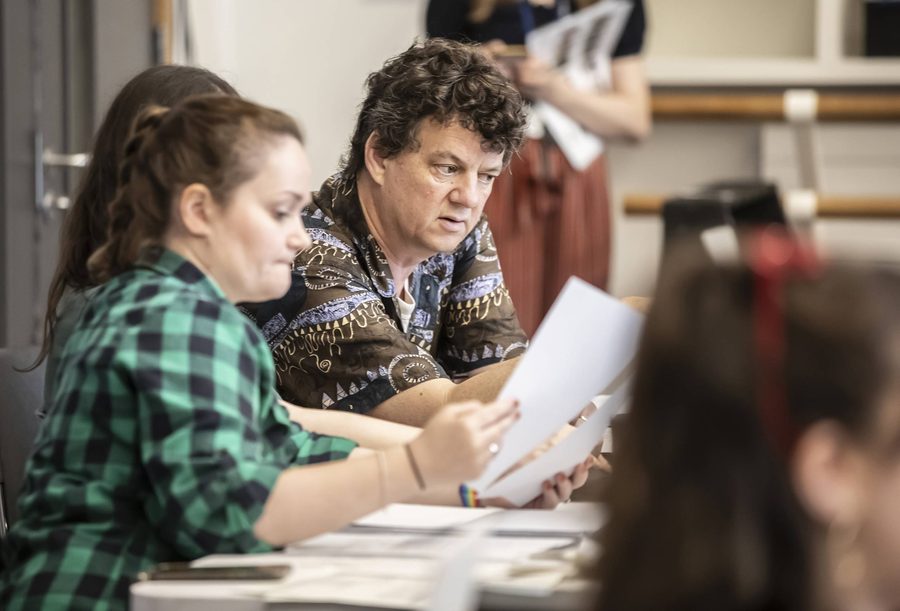
Tom Morris (Director) in rehearsals for War Horse tour. Credit Pamela Raith Photography
Do you think people will react differently to War Horse in present day than they did in 2007?
When we made the show, first of all, the understanding of the way in which the First World War in particular was remembered was at a sort tipping point. At that time it felt as if we were moving away from the poppy being a symbol of militaristic patriotism (which I think it was for many people through much of the 20th century), to the poppy being a symbol of profound regret about war. This move was contextualised by the brutal and very raw realities of the war in Iraq which was fresh in the news cycle at the point we were thinking about the development of the piece. I don’t think we’d processed that, although it was a very hot topic politically. Now, I think that we’re more advanced in terms of the way that the First World War is remembered. In other words, there are fewer people now who would say that a poppy was a symbol of militaristic nationalism than there were, and our understanding of the contemporary wars that we’re seeing is vivid, sceptical, and furnished by the brutal imagery available on the internet. At the moment, we have the war in Ukraine, and the conflict in Gaza. Quite what all of those contemporary resonances will mean for an audience watching the play War Horse in 2025, I can’t predict. You never can predict these things with a play. But I am fascinated to hear what audiences make of the show as it tours in this revival. What the audience will make of it is the great and profound mystery of theatre making. In particular, we don’t know what young people will make of it. That is because the sensibility of the young is prophetic. It’s ahead of the game.
How did you begin the rehearsal process when reviving War Horse?
Just as when we first made the show, it was vital to have some time for exploration of the historical detail about the play. We’re coming back to the story, we’re not simply mechanically putting it back together. Therefore reading All Quiet on the Western Front is just as important as it was the first time round, and the recent film adaptation of that book is incredibly powerful too. We urged the cast to watch Director Tom Morris in rehearsals, August 2024 Pamela Raith Photography 11 that. Book and film offer two very direct ways to understand the visceral experience of being in a war, and in that particular war (World War I). All Quiet on the Western Front is written from the German side, so it’s a very useful structural reminder about the humanity of everyone involved on both sides. We also took the cast to visit the Household Cavalry working with horses. We asked John Tams, who collected and reworked the songs from the original production, to tell them about the experience of singers, song makers and musicians who ended up in the army during the Great War. Something that is new in the rehearsal room since the pandemic is that we also had a wonderful drama therapist called Samantha Adams (who I’ve worked with on a number of shows) in the room with us. She looks after the creative process in relation to some of the more traumatic elements of the story and the background. Particularly since Covid, that’s an aspect of creative practice that I’ve found very helpful. I think the creative community is more alert to what is essential, what is necessary, or what is helpful in looking after the wellbeing of a group of people who are getting together to tell a story.
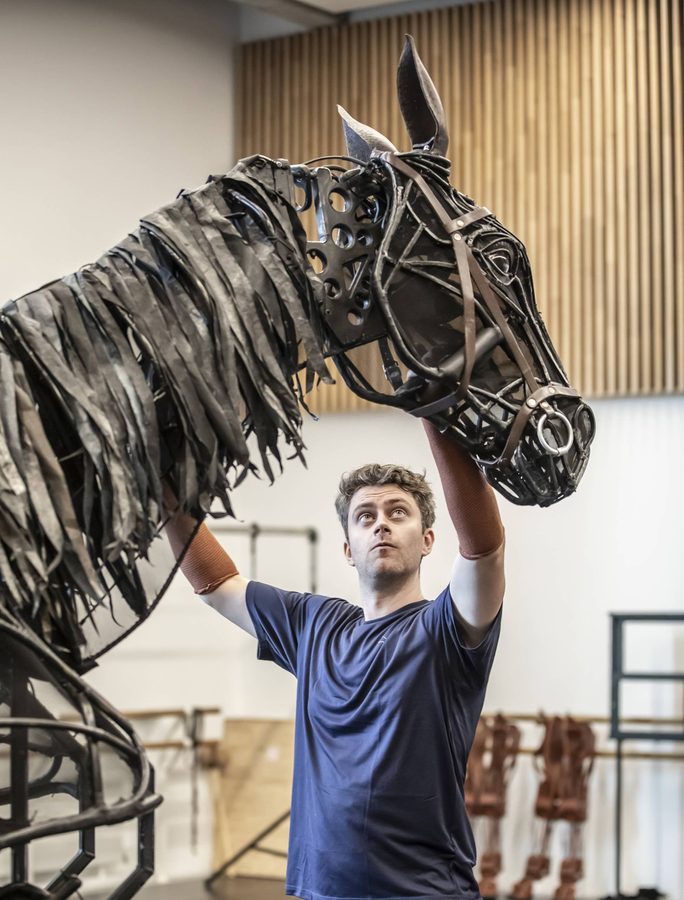
Tea Poldervaart in rehearsals for War Horse tour. Credit Pamela Raith Photography.
Did you also look at the poetry of the First World War? How did you decide which poems to explore?
There’s a poem by Edward Thomas called ‘As the Team’s Head Brass’, which is set in the time of war. Thomas’ war poetry is still rooted in his sense of the English landscape, which is very useful for the parts of our story which are set in the agricultural community of Devon. The classic Wilfred Owen poems are great too. We invite people to bring in poetry they like. I think John Tams brought in Thomas Hardy, for example. And then there are books such as Forgotten Voices of the Great War by Max Thomas, which brings in direct experience from people who fought. I’ve also got my grandfather’s diaries, which are, again, another important source in terms of sensibility, of what the stratagems were that people used to describe the experiences that they were going through. So from diary entries to the canon of poetry we had a range of sources, and it’s important that we keep refreshing that. In one of the revivals, I got people to read some Keith Douglas, which is from the Second World War. And in another iteration, I brought in some Ivor Gurney poems. So there are different people that we would use to inform our work. The poems inform character and the understanding of a situation. For example, in ‘Dulce et Decorum est’, Wilfred Owen’s description of a gas attack is useful for the scene in which there’s a gas attack. Edward Thomas’ poetry about the landscape is useful for the moments where Albert might be thinking about the landscape.
Can poetry be helpful even if we find it difficult?!
I think the idea of poetry as a present is sometimes a really nice way to unlock the understanding of it.
What’s your directorial approach in the rehearsal room?
This is a revival. We’re recreating the show, so we’ve got a blueprint that we can work from. Normally, I always try to have an idea of what I think a scene should be like before I go into a rehearsal. But it’s a massive positive if a better idea comes out of the room. I really respect directors who work differently. There are some directors who know everything that they want to happen from the starting point and you’ve got to admire that. I think the directors that really inspire me personally are people like Simon McBurney, Phelim McDermott and Emma Rice. They all proceed through a process of uncertainty to discover what the language of the show should be.
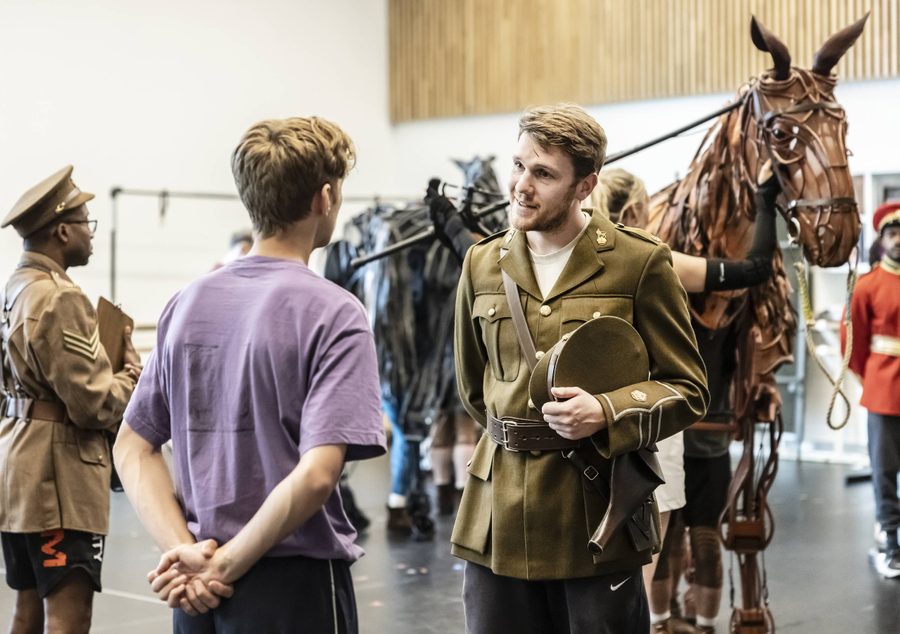
Chris Williams and the cast of War Horse in rehearsals. Credit Pamela Raith Photography.
The dates that are written on the sketches (in Rae Smith’s set design and the projections) are historically accurate. Why was that important in the design?
There are actually two answers to that. One is that the sketches in my grandfather’s notebook are dated like that, and people did date them, so there’s a level of authenticity in it. However, one of the challenges with the show, which is actually quite light on language (in terms of the amount of text there is), is the communication of the passage of time. So it helps indicate the passage of time; it’s an important storytelling device. Emotionally, it’s not important – it’s about the continuity of the experience of the boy and the horse – but it’s a helpful narrative device.
War Horse plays Newcastle Theatre Royal Wed 10 – Sat 20 Sep 2025. Tickets can be purchased here or from the Theatre Royal Box Office on 0191 232 7010.
Coming soon
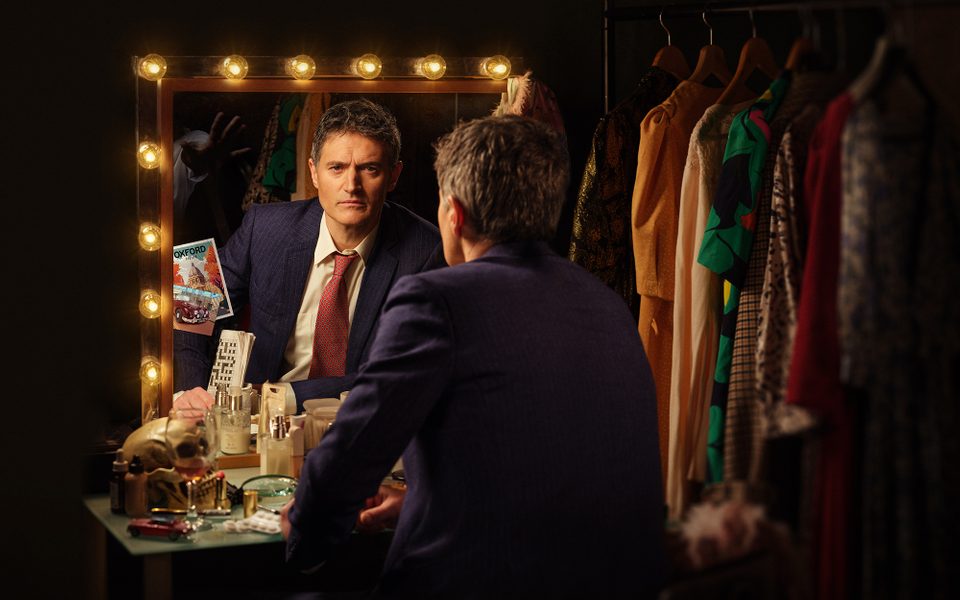
Inspector Morse: House of Ghosts
Tue 3 – Sat 7 Feb 2026
The first-ever stage adaptation of the iconic detective
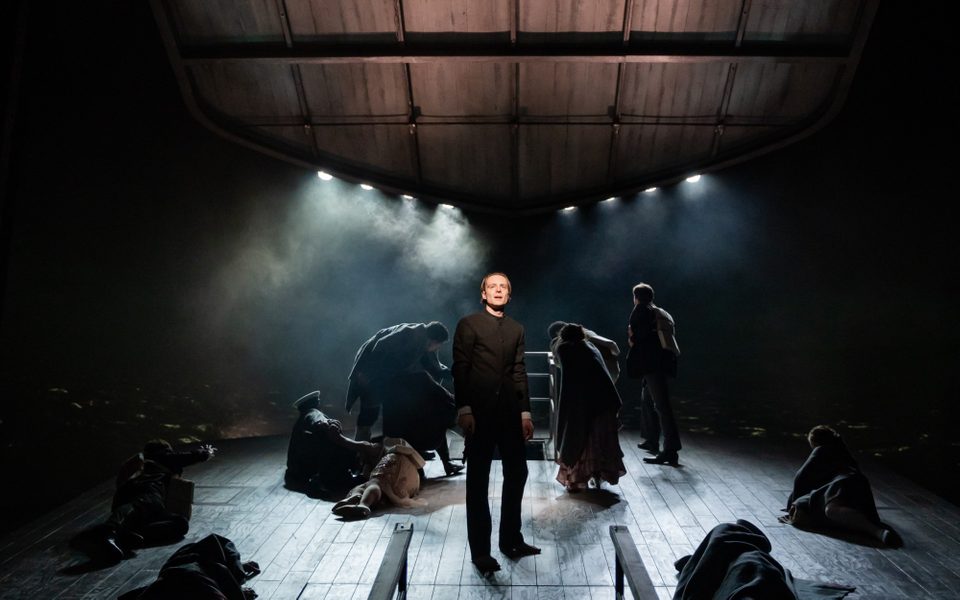
Hamlet
Royal Shakespeare Company
Tue 31 Mar – Sat 4 Apr 2026
The Royal Shakespeare Company return to Newcastle

2:22 A Ghost Story
Mon 13 - Sat 18 Apr 2026
Belief and scepticism clash...
Latest news

Cast announced for world premiere production at Newcastle Theatre Royal
- Cast Announcements
- Creative Engagement
- Shows
- Theatre Royal News

Full cast announced for Gerry & Sewell London
- Cast Announcements
- Shows

